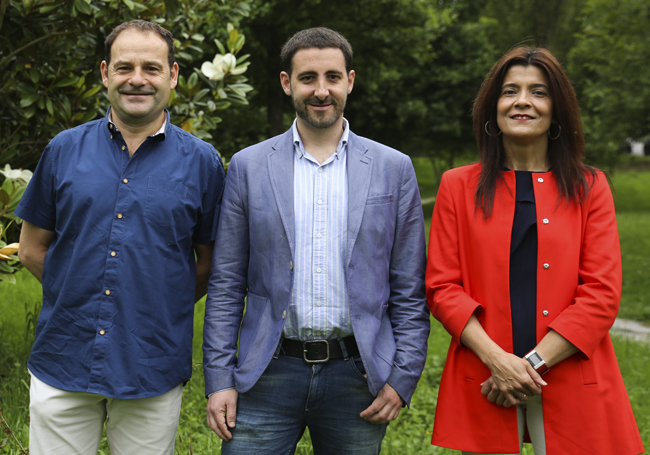The research by the UPV/EHU reveals that the mere fact that family SMEs have a board of directors does not guarantee that innovation will be implemented. What is needed is a board that is active, involved and which has committed members irrespective of whether they are connected with the family or come from outside the family ownership.
An involved board of directors, a key component in innovation in family SMEs
A study of 230 enterprises of this type by the UPV/EHU-University of the Basque Country analyses how their boards are composed and how they function
- Research
First publication date: 25/06/2018

The vast majority of enterprises worldwide are small and medium-sized, family-run ones (SMEs). Their small size and special family nature determine their strategies on innovation and how they function. They have limited resources available and experience barriers such as the difficulty in accessing funding or highly qualified personnel. At the same time, the need to balance the interests of the family and of the enterprise influences their strategic decisions, including those geared towards innovation. Faced with this predicament, family-run SMEs more and more often opt to set up boards of directors so that, besides controlling the decisions taken by the managers of the enterprise, they support and instruct these professionals when it comes to designing and implementing specific strategies and projects relating to innovation.
Yet many family-run SMEs that have opted for this measure have not achieved the objectives set. So one is forced to ask the following question: Is it a mistake to form boards of directors as a body to support the achieving of satisfactory innovation aims?
The study is part of the international PhD thesis by Unai Arzubiaga, written up under the supervision of Dr Amaia Maseda and Dr Txomin Iturralde, lecturers at the UPV/EHU’s Faculty of Economics and Business. It was produced using a sample of 230 family SMEs across Spain and focussed on two crucial aspects when it comes to innovating: the composition of the board and how it works. With respect to the composition of these bodies, the advantages and disadvantages of including family board members were analysed in terms of involvement in and connection with the business as well as in terms of access to competences, capabilities, networks and contacts. With respect to how they function, they studied the strategic involvement of the board members, their contribution, knowledge and capabilities in practice and, finally, the intensity of the activity of the board itself in terms of meeting frequency and duration.
Although the importance of the board of directors and the drive of innovation is recognised in the academic literature, the research by the UPV/EHU provides a novel approach since until now there has been no analysis as to which elements of the board are the most defining, and much less in the sphere of family-run SMEs that comprise the largest portion of the business base worldwide.
Involvement and commitment, key aspects in innovating
The study reveals the clear difference between, on the one hand, having a merely formal board of directors (as many family-run enterprises have) set up for symbolic reasons to fulfil specific legal obligations, and, on the other hand, having one involved in and committed to the business activity, and which acts as a true governing body of the enterprise, with active involvement in decision-making strategic in generating value. So a board of directors that not only performs the usual task of supervising the management, but has a high degree of strategic involvement, and facilitates the design and deployment of new innovation processes.
Knowledge, competences and capabilities of the members of the board of directors are decisive in promoting entrepreneurial attitudes within the company. “The strategic involvement of the board members beyond their origin (family or non-family board member) is what allows the family SME to decide to move from the wish to innovate to the actual decision to innovate,” said the researchers.
The intensity of the activity of boards of directors could be a double-edged sword when it comes to successfully implementing innovation strategies. "Only in the case of boards with a high degree of involvement of the family members can one see that the greater activity of the board encourages innovation. In other cases, overdoing their action may cause difficulties and tensions to surface between the board and the family and which could affect the deployment of these processes,” they added.
Additional information
The work was published in the international Journal of Business Venturing, regarded by the Financial Times as one of the 50 most influential global publications and which enjoys great prestige among academics, business people and leaders of the public sector worldwide. This work is also part of the international PhD thesis by Unai Arzubiaga-Orueta (Getxo, 1983), entitled “Orientazio ekintzailetik familia enpresen emaitzara: estrategiari buruzko erabaki hartzearen analisia Admnistrazio Kontseilu eta zuzendaritza mailetan- From entrepreneurial orientation to firm performance in family firms: analyzing the influence of strategic decision-making at the corporate and management levels”. It was written up under the supervision of Dr Amaia Maseda and Dr Txomin Iturralde, tenured lecturers at the UPV/EHU. Specifically, this work is the result of a research stay by Arzubiaga at the prestigious Lancaster University Management School
Bibliographic reference
- Entrepreneurial orientation and innovation in family SMEs: Unveiling the (actual) impact of the Board of Directors.
- Journal of Business Venturing
- DOI: 10.1016/j.jbusvent.2018.03.002







